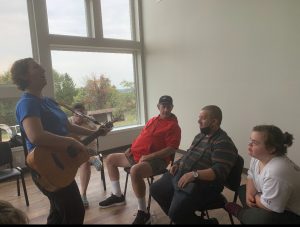


Jaclyn Sinclair MT-BC, MS in Music Therapy
Jaclyn is a Board-Certified Music Therapist who got her start right here at Winslow. Following college at George Mason University where she studied marketing and minored in music performance, Jaclyn was unsure about choosing either as a career path. After speaking with Virginia Mazza (Winslow co-founder) about her situation, she responded with “you’re coming to Winslow!” Jaclyn started as a volunteer and quickly learned the profound effects of therapeutic riding and the impact it has on the individual. During this time, Jaclyn realized that she wanted to go into a therapeutic field. Having some basic knowledge of music therapy, she decided to research further and found it to be the perfect combination of utilizing her musical training and interest in psychology.
Shortly after, Jaclyn started attending music classes at OCCC and eventually made her way to SUNY New Paltz where she graduated with a Masters in Music Therapy and received her MT-BC in 2014. Jaclyn was welcomed back to Winslow as a professional music therapist and spent three years working with adults and children with special needs. Since that time, Jaclyn has worked all over the tristate area continually developing her skills and working with a variety of populations. The diversity and flexibility of music therapy makes it applicable to so many in need of therapeutic services including mental health, traumatic brain injury, cognitive disorders, early childhood, ASD and IDD, etc.
Jaclyn is incredibly excited to return to Winslow and create a thriving music therapy program once again!
FAQs:
What exactly IS music therapy?
The textbook definition as stated by the American Music Therapy Association is “the clinical & evidence-based use of music interventions to accomplish individualized goals within a therapeutic relationship by a credentialed professional who has completed an approved music therapy program.”
What this means is that we are trained clinicians who use music to achieve non-musical goals.
Example A) If the goal is to improve emotional regulation, a music therapist can help a client learn appropriate coping skills using a musical stimulus such as setting a breathing pattern to a client-preferred song. This skill can then be transferred to everyday life.
Example B) If the goal is to improve range of motion in an upper extremity, a music therapist can use drums to set up “targets”, starting with current functioning level and increasing the distance over time as range of motion improves. Setting exercises to music also makes the entire experience more enjoyable and can even help reduce pain perception.
Music is instrumental (no pun intended) in helping with self-expression and overall mental wellness. The famous saying by Hans Christian Anderson, “where words fail, music speaks” says it all. Many of us are affected by music on a daily basis and already turn to it to emulate our emotions. Music can promote healthy stress responses, reduce anxiety and depression, provide motivation and distraction during exercise, express ourselves both verbally and nonverbally, and create new neuropathways in the brain. Music therapists are trained professionals and use music as their tool to assess, plan, and implement a therapy program designed specifically for the individual or group receiving services.
Do I have to know how to sing or play an instrument?
Not at all! Eligibility for music therapy is done through an assessment administered by the therapist and requires absolutely no musical skill. All you need to bring is a willingness to try. It is the therapist’s responsibility to make playing music accessible and set the client up for success. We strongly believe ANYONE can make meaningful music.
Is it covered by insurance?
The short answer is that music therapy is not directly reimbursed by insurance yet.
The long answer is that there are ways music therapy can possibly be reimbursed through Medicare or private insurance.
Medicare may cover music therapy for children with certain diagnoses under the Children’s Home and Community Based Services (HCBS) Waiver. For more information go to https://www.health.ny.gov/health_care/medicaid/redesign/behavioral_health/children/overview.htm.
For private insurance, it is recommended you speak with your provider to find out if and how music therapy can be covered. It is also important to remember that your deductible may need to be reached first and paying out of pocket might prove to be a more economical option. Your music therapist will assist in providing the needed materials requested by your insurance provider.
All providers, including myself, have an NPI (National Provider Identifier) number which can be found at https://nppes.cms.hhs.gov/.
Children and young adults diagnosed with ASD (Autism Spectrum Disorder) may be eligible for coverage under IDEA (Individuals with Disabilities Education Act). Individuals receiving self-directed services under OPWDD may also be able to use their funds towards music therapy. Community grants are another avenue worth exploring.
I’m already receiving other therapy services, can I still benefit from music therapy?
Yes! Music therapy is commonly used in conjunction with other modalities. In my own experience, I have successfully co-treated with physical therapists, occupational therapists, speech therapists, nurses, and special education teachers. Music therapy is highly adaptable and can be a great addition to receiving other therapies, including therapeutic riding. Music therapy can provide added motivation during co-treatments as well as support goals being addressed in other therapies. You are not required to disclose to your music therapist if you are receiving other services but it is recommended for the best possible treatment. It may be important to consult with other therapists for safety and treatment purposes, but this would only be done with client consent.
How much does it cost?
While we cannot accept insurance directly, there are ways it is possible to get financial assistance. Please refer to previous FAQ “It is covered by insurance?”
Anyone interested in receiving music therapy must be assessed by a professional music therapist. Assessments are used to determine the appropriateness of music therapy for a client and, if so, what goals will be addressed. Music therapists are clinicians and must be unbiased when determining whether to provide services as per AMTA’s Code of Ethics.
Rates are as follows:
Assessment- Free
30 Minute Session- $50
45 Minute Session- $75
60 Minute Session- $100
Recommended session lengths are determined by the therapist after an assessment and are based on what is deemed clinically appropriate.
Currently, there is no sliding scale but any funding (scholarships, grants, etc.) used to support music therapy will be announced on our website.
I’m interested in learning an instrument, do you give lessons?
That depends on the reason. Music therapists can provide therapeutic lessons which means that the process of learning an instrument is the intervention to achieve a goal. For example, if the goal is to express oneself through song-writing or improve finger dexterity, then lessons are appropriate because there is therapeutic intent. If you are simply looking to learn an instrument, then music therapy would not be considered appropriate and it would be recommended that you seek a musician or teacher providing lessons. Many children and adults with IDD respond well to learning an instrument and would be considered a good candidate for music therapy as it can address different goals in the process.
Do I need a referral?
No, referrals are not required to start music therapy but they may be needed for insurance purposes. If trying to get reimbursement, it is important to speak with your provider and see if a referral is needed.
Do you provide music therapy to the horses?
I get this question a lot! While there is strong evidence that horses respond to certain musical stimuli and I would love to explore that, my expertise and training is with humans. Co-treatments may be possible but we have yet to determine the safety of music therapy while receiving equine therapy and are not recommending it at this time until we have more information. That being said, music therapy can certainly be used in conjunction with therapeutic riding and provide different interventions while working towards similar goals.
